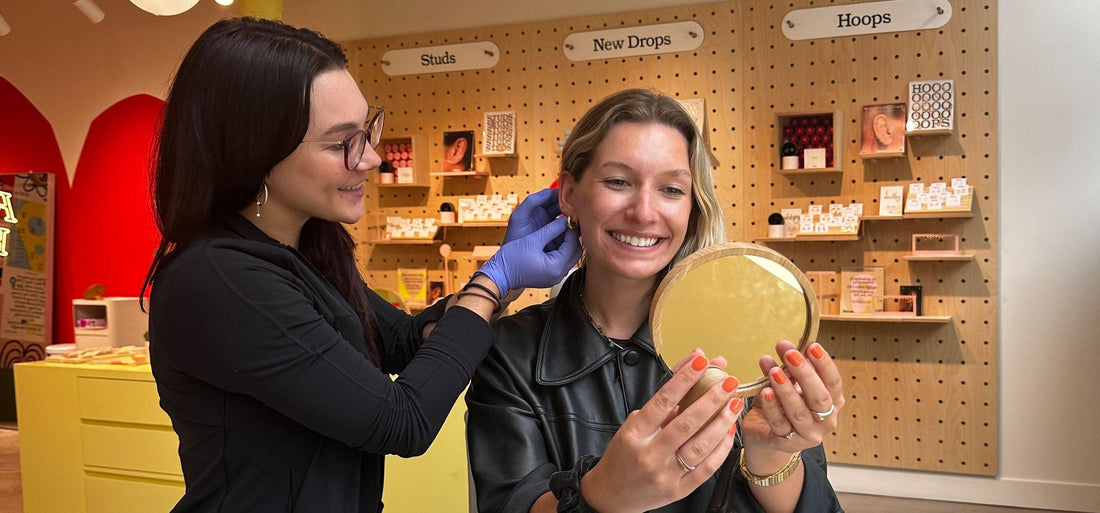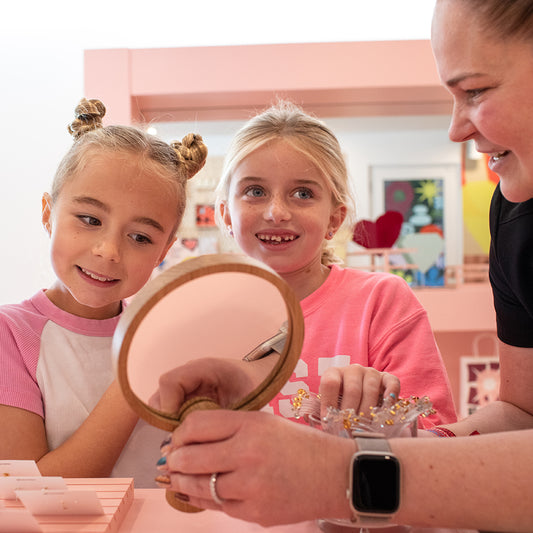Can Diabetics Get Ear Piercings Safely? A Guide for Ear Piercing for Diabetics

Discover whether diabetics can safely get ear piercings. Learn about risks, precautions, and expert advice for managing diabetes while considering piercings.
Having your ears pierced isn’t always as simple as walking through the doors of a studio; for some, health concerns must be addressed in order to ensure safe and healthy piercings. This is especially true for diabetics. If you’re one of the 37 million Americans who are managing diabetes and are also considering having your ears pierced, read on to have all your questions addressed (Diabetes Research Institute Foundation, 2023).
Understanding Diabetes and Its Impact on Healing
Diabetes is a complicated healthcare condition that impacts the body's ability to convert blood sugar into energy. This happens as a result of deficient insulin production or when the body doesn’t respond to insulin as it should. There are various forms of diabetes, including Type I, Type II, Gestational Diabetes, and pre-diabetes (CDC, 2023).
Diabetes can negatively affect the body’s healing process, and this is especially true for those who have difficulty keeping their blood sugar within normal limits. This can mean delayed healing (meaning your piercing will take longer than it will for someone without diabetes) or a higher chance of infection.
Consulting with a Healthcare Provider
Before having your ears pierced, it’s important to have a discussion with your primary care provider to determine whether you are a good candidate for ear piercing. Every ‘body’ is different, and no two people have the same health considerations. Your individual diabetes management plan may need to be adjusted before undergoing any elective procedures, such as an ear piercing.
Choosing a Professional Piercer and Studio
Once your healthcare provider has given you the ‘okay’ to get pierced, the next step is to research and select a reputable piercer and studio. You want to ensure your piercer is well-trained and up to date with the latest standards. (P.S. - Read about how the Rowan Clinical Piercing Standard is gaining national recognition.)
It’s important to find a studio that is clean and hygienic and is a safe space that makes you feel welcome. Rowan’s got you covered in all aspects; plus, with our nurses, we know what to do if you start to feel woozy.
Preparing for the Piercing Process:
On the day of your appointment, these tips can help ensure your appointment goes as smoothly as possible:
Eat before your appointment, and don’t come in with an empty stomach.
Have a glucose-rich snack/drink on hand - this will help in case you get lightheaded. Have a dextrose-based treat such as apple juice or gummy worms - dextrose will enter your bloodstream quickly in the event that you need to bump up your blood sugar.
Schedule your appointment so that you’re not coming in right after taking insulin (if applicable)
Aftercare Considerations:
Once you’ve received the clear from your healthcare provider, there are additional things you can do to ensure you have a smooth healing process:
-
Be prepared to switch into hoops asap
- Starting a new piercing with studs is important to make sure the piercing is straight; however, switching to an endless hoop or huggie as soon as possible will ensure adequate airflow and the least amount of friction to the piercing. This will help your piercing heal without complications. Note- this may not be possible in all piercings.
-
Strict aftercare regimen
- Avoiding an infection is the top priority in ensuring a smooth healing process. Strictly adhering to the aftercare regimen as instructed by your piercer will set you up for success.
-
Be on the lookout for signs of infection
- If you feel that you’re developing an infection, early treatment is key to saving your piercing (check out this blog to help answer any questions about infection vs. irritation). Excessive swelling, redness, yellow-green discharge, or fever can all indicate that an infection is starting and will need to be treated by your doctor.
-
Use only hypoallergenic, nickel-free jewelry
- Irritating jewelry can lead to infection or a metal allergy down the road. Be sure to stick with only hypoallergenic and nickel-free jewelry to avoid any complications.
-
Maintain a healthy lifestyle and diabetic management according to plan set with your primary care provider
- Keeping tight control of your blood sugars will help keep your new piercings healthy.
Potential Risks and Complications
For individuals with diabetes, the process of getting their ears pierced presents unique challenges and potential risks. Diabetes can compromise the body's healing ability, leading to prolonged recovery times and an increased susceptibility to infections. The elevated levels of blood sugar characteristic of diabetes can hinder the body's natural healing processes, potentially causing complications such as delayed wound healing and a greater risk of infection around the pierced area. Diabetics must be especially vigilant about maintaining their blood sugar levels within the recommended range to mitigate these risks.
There are special considerations for different types of ear piercings. For example, cartilage piercings have a longer healing timeline than lobe piercings. For diabetics, this timeline may be extended for piercings in either location, but especially for cartilage piercings.
Considering Alternatives and Temporary Options
If ear piercing isn’t an option for you, a great alternative is an ear cuff. The cuff wraps around your ear, giving the appearance of a piercing without needing to go under the needle.
In conclusion, if you're one of the millions of individuals managing diabetes and contemplating getting your ears pierced, it's imperative to approach the process with careful consideration and a focus on your health. Diabetes introduces unique challenges to the healing process, including delayed recovery and a heightened risk of infection, making it crucial to consult your healthcare provider before pursuing any piercings. Selecting a professional piercer and studio that prioritize hygiene and safety is paramount. Adequate preparation for the piercing day, coupled with strict adherence to aftercare instructions, will contribute significantly to a smooth healing journey. While there are additional risks for diabetics, such as extended healing timelines and heightened infection susceptibility, taking precautionary measures and opting for alternatives like ear cuffs can provide a safe and appealing alternative. In the end, a proactive approach to piercing, mindful of your diabetes management, ensures the best chance of a successful and healthy outcome.
References:



